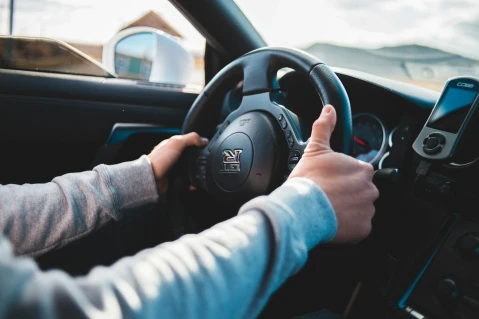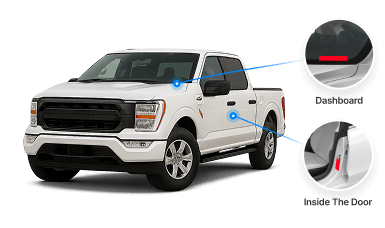
A Beginner's Guide to Test Driving Cars: Everything to Know
Our team will tell you how to test drive a car.
Enter any Colorado license plate number and get the VIN, title status, accident history, and market value in under 30 seconds
Looking for the VIN?
Here is there you’ll find it:

Colorado license plate lookup is a vehicle history check using a Colorado license plate. The procedure can help find the vehicle's VIN and show a brief report: whether there were accidents, restrictions on rights, mileage, or recalls.
Plate-to-VIN Match
EpicVIN instantly resolves a Colorado plate to the vehicle’s 17-character VIN - no manual VIN decoding required.
Instant Check
We cross-check NMVTIS and trusted partner records for Colorado vehicles, surfacing title brands, registration events, theft/salvage activity, and emissions history.
Vehicle History Report
Get a quick snapshot for Colorado vehicles: accidents/damage, title status, mileage readings (incl. emissions results where available), and open recalls - without exposing personal details.
Expect to see the VIN, basic vehicle specs, and any reported incidents (e.g., accidents, salvage titles, or recalls). Private owner details are not included, keeping the process legal and privacy-safe.
Reports never include the owner’s name or address, live ALPR location, driver’s license, or insurance numbers. DPPA and the Colorado Privacy Act restrict PII; reports are for informational purposes only - not for FCRA-regulated (Fair Credit Reporting Act) decisions.
A Colorado license plate lookup uses the tag plate number to query public database records and check details tied to the vehicle identification number. Enter the plate and select Colorado; EpicVIN resolves the VIN and compiles the record from NMVTIS and partner sources (including emissions history where available).
Works with standard plates, personalized license plates, and most group designs; temporary permits may not return a VIN until registered. This plate finder supports license plate-to-VIN and find VIN by license plate workflows for compliance-safe vehicle owner lookup.
Year 2000
Make INFINITI
Model I30
Fuel Type Gasoline
Engine 3L V-Shaped VQ30
Made in JAPAN
| Indicator | Colorado (2025) | Potential Risk |
|---|---|---|
| Accidents/Damage | ≈115,000 accidents in 2025 | Hidden damage, reduced safety, and resale value. |
| Theft | High theft incidence (≈20,000 cases in 2025) | Elevated theft risk; possible loss/confiscation and insurance complications. |
| Salvage/Rebuilt Titles | ≈1 in 8 - salvage/rebuilt - ~12% | Serious prior damage; residual defects and safety concerns. |
| Odometer (mileage) | Odometer anomalies - ~1.3% (≈67,751 vehicles) | Mileage fraud risk; overpayment and unexpected repairs. |
| Open Recalls | Many open recalls - ~17% (≈885,969 vehicles) | Unresolved safety defects; increased accident risk until fixed. |
| Inspection/Emissions Patterns | Emissions/Inspection Patterns failures - 8.6% (2025) | Engine/emissions issues; costly repairs and registration delays. |
The Colorado DMV can release a vehicle record via DR 2489A (Motor Vehicle Requestor Release Affidavit of Intended Use) or online for permitted purposes, but it’s slow and registration-focused; EpicVIN provides an instant, multi-source vin check free (NMVTIS title/brand/lien, plus, where available, Air Care Colorado inspection entries). For routine due diligence, most shoppers start with a Colorado license plate search or VIN finder rather than a formal mail request.
Prefer to double-check? Use NHTSA’s recall lookup to corroborate important findings.Alex Black, CMO & auto expert, EpicVIN
In Colorado, license plate lookup questions often overlap with vehicle registration costs, county processing, and plate choices. Specific details live on the Colorado Department of Revenue DMV License Plates (https://dmv.colorado.gov/license-plates) and Taxes page (https://dmv.colorado.gov/taxes-and-fees).
Are two license plates required in CO? Yes. Most passenger vehicles display front and rear plates; motorcycles and trailers display a single rear plate.
Fines/penalties vary by locale. Colorado sets a $100 fine for obscured/covered or unreadable plates. The state charges $25 per month (max $100) for expired registration/temporary tags. Denver’s “license plate” parking citation is $100.
| Plate type/Action | One-time plate fee | Where to obtain | Form/official link |
|---|---|---|---|
| Standard passenger plates (new issue) | $7.38 (set)/$3.69 (single) | County Motor Vehicle Office | Regular License Plates - DMV |
| Vanity (personalized) plates (initial) | $60 personalization (one-time) | myDMV or County Motor Vehicle Office | Group Special/Personalized Fees - DMV |
| Specialty background plates (issuance) | $50 one-time issuance | County Motor Vehicle Office | Group Special Plates - DMV |
| Replacement plates - regular | $7.38 (set)/$3.69 (single) | County Motor Vehicle Office | DMV - Lost/Stolen Plates |
| Temporary registration/permit (non-commercial) | $7.03-$7.66* | County Motor Vehicle Office | Dealer/County Temporary Permits |
- *The fee amount is county-specific. Check with your county.
- Amounts above exclude registration taxes/fees (vary by weight/municipality; see the DMV fee pages).
- Some programs add annual contributions; those aren’t shown here (one-time plate costs only).
- Fees verified: Sep 2025.
EpicVIN complies with the DPPA and C.R.S. § 24-72-204(7) & § 42-1-206; we do not sell vehicle owners' personal data (only de-identified vehicle data). We do not provide the owner's name, address, or contact information — this is prohibited.
Colorado
CLVY33
2019 BMW X3
Colorado
GUTRBOL
2016 BENTLEY CONTINENTAL
Colorado
FJCA36
2023 TESLA MODEL 3
Colorado
710STZ
2002 DODGE RAM
Colorado
DRMF57
2019 FORD EXPLORER
Colorado
DMQR95
2024 GMC SIERRA
Colorado
TZQ137
2013 FORD ESCAPE
Colorado
BSD245
2004 CHEVROLET SILVERADO
Colorado
DRCP79
2009 GMC SIERRA
Double-check the entry (0 vs O, I vs 1) and make sure Colorado is selected. Very new or temporary tag(s) may not be linked yet - try later or use the VIN. You can contact our support via chat or email.
Temporary tag(s) and freshly issued plates often aren’t in statewide databases yet. Ask the seller for the VIN or retry in a few days.
Yes. We don’t notify anyone about your lookup, and we don’t display owner PII. Results focus on valuable information about the vehicle, not personal identity.
Yes. EpicVIN supports other states; just pick the right state before you run your plate lookup.
No. Under DPPA and Colorado law, names and address info are private; reports focus on the vehicle rather than past or new owners.
Use the windshield/dashboard VIN, door-jamb label, or insurance card; then run a VIN check.
Consider walking away; missing VIN blocks you from due diligence on the vehicle’s history and service flags.
No. Real-time tracking isn’t provided; our finder surfaces lawful records only.
Many do; enter the plate number, select Colorado, and see if a VIN returns.
Many POD plates are printed and sent by mail to the address on file after payment is approved.
Discover expert tips, news and advice on buying and maintaining used vehicles

Our team will tell you how to test drive a car.

Continue reading to discover some insightful safe driving tips for new drivers...

Check our guide that features the best Mercedes SUV models.